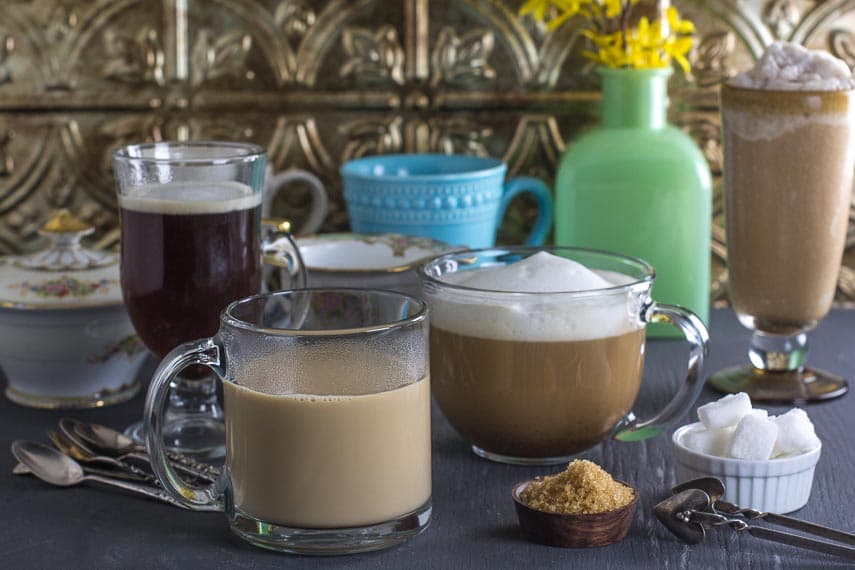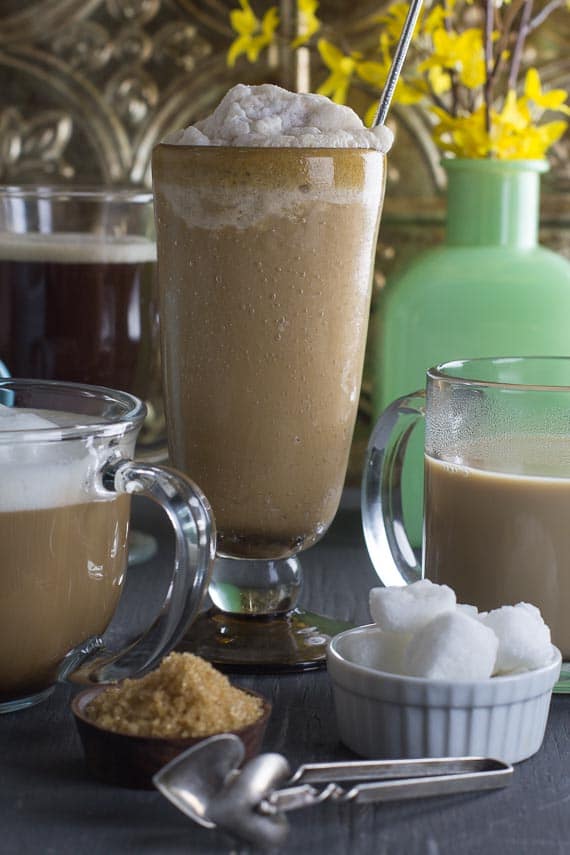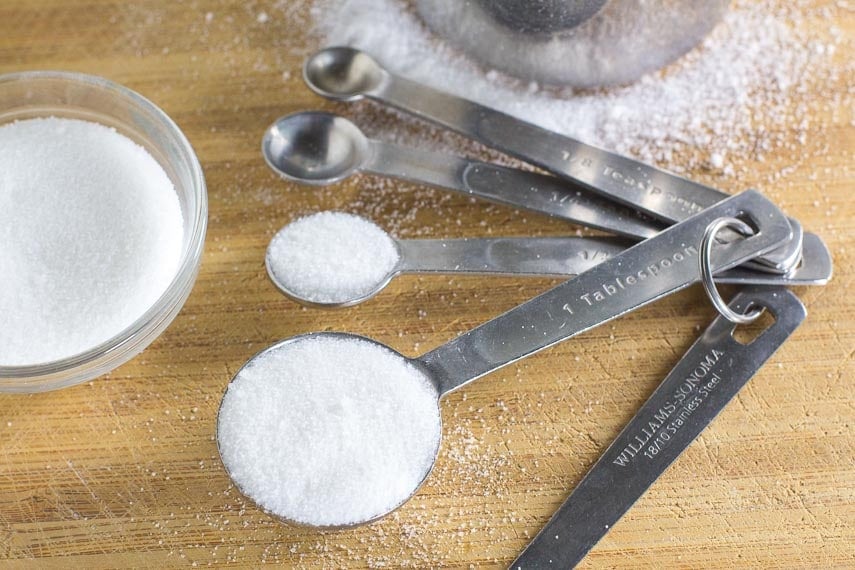Can I Drink Coffee on Low Fodmap Diet
You CAN Have Coffee on the Low FODMAP Diet – Maybe
The very concept of coffee comes up a lot in discussions of IBS and FODMAPs, so we thought we would address this in this article, The Low FODMAP Diet, Coffee & Coffee Drinks.
Everyone wants to know if they can still have their favorite coffee drink – and the answer is, perhaps!

Low FODMAP is Not The Whole Issue
Coffee is low FODMAP, but caffeine can be an irritant for many people, those with IBS and even those without, hence the confusion.
Coffee contains caffeine, which is a gut irritant,so although it may be low FODMAP, there are still other issues to address. In addition to raising blood pressure and giving some folks the "jitters",that anxious, nervous feeling, it can also stimulate gastric motility.
Simply put, it revs up your gut,you may get cramps from contracting muscles along the digestive tract and this is why it can send you running for the bathroom. Coffee can also increase stomach acid, which for many results in heartburn and indigestion.
PS: caffeine found in sodas, energy drinks – even supplements – all could create the same reaction, so be aware.

I Want My Coffee!
Drinking a nice hot cup of coffee or espresso in the morning is a very personal decision,not only from the energizing caffeine point of view, as it affects everyone differently in that regard, but also from a digestive upset point of view.
Some folks can drink coffee right before they go to bed and sleep like a baby. Others (like me) cannot have any caffeine after 2pm, or my nighttime sleep will be compromised.
It cannot be overstated that YOUR INDIVIDUAL experience is very important. Work with your registered dietitian to assess your reactions, and proceed accordingly.
Brewed Coffee, Espresso & Instant Coffee
When you check your Monash University Low FODMAP Diet Smartphone Appyou will see many entries for coffee, including espresso, instant coffee and many coffee based drinks combined with dairy milk, as well as alt milks.
The FODMAP Friendly Appprovides some lab-tested results for various coffees as well.
Here is some basic information from both sources.
Low FODMAP Coffee Amounts
Black Coffee:
Brewed coffee, regular or decaffeinated, black:6-ounce (180 ml) cup
Espresso, regular or decaffeinated, black:single shot (30 ml); double shot (60 ml)
Instant coffee, regular or decaffeinated, black:two heaping teaspoons (4 g total)
Coffee pods, black:1 pod (8 g)
Coffee Drinks:
Espresso, regular or decaffeinated: 1 shot (30 ml) with 220 ml of low FODMAP milk alternatives; double shot (60 ml) with 190 ml low FODMAP milk alternatives
Instant coffee, regular or decaffeinated:two heaping teaspoons (4 g total) with 100 ml of low FODMAP milk alternatives
Creamer Powder
Monash lists "creamer powder" and we do not have specifics as to what the products that they tested contains. They give 2 teaspoons (3 g) a Green Light. It should be noted that it only hits a Yellow Light Moderate level of FODMAPs at 1 cup (100 g), which is quite a large amount.
Cream, Milk & Alt Milks
Some of you like your coffee black – and then some of us like a little (or a lot) or milk or perhaps a milk alternative. The same approach applies to these liquids as if you were going to drink them on your own. Consult your Monash University Low FODMAP Diet Smartphone App for more complete information.
The Monash app, which represents lab tested values, says we can have 2 Australian tablespoons of heavy cream and even evaporated milk in 2 teaspoons.
Monash says that 2 teaspoons of A2 milk is allowed as well.
In general, for milk you can choose from lactose-free cow's milk, almond milk, hemp milk, oat milk, coconut milk, macadamia milk, rice milk and soy milk made from soy protein (not whole soybeans) – but the types and amounts make a difference! Study the app and educate yourself.
By the way, if you want to make your own lactose-free dairy, we have the instructions in our DIY Lactose-Free Dairy article.
Sugar & Sweeteners
The same approach applies with sweeteners. If they are low FODMAP in general, you can add them to your coffee. We have an in-depth article on all kinds of Sugar that you can refer to.
In general, you can use white granulated sugar, brown sugar, raw sugar, stevia as well as maple syrup.
Honey and agave are high in fructose and therefore high FODMAP, HOWEVER you can have 1 teaspoon of either one, which might just be enough for your cup of joe.

Takeaway
If you suffer with IBS and want to drink coffee, proceed with caution and moderation.
Once you are in a calm period, with few IBS symptom breakthroughs, try maybe a quarter or half a cup of coffee and assess your reactions. For some, the reactions will come quite quickly and you will know to steer clear of your caffeine boost, at least for now.
Always discuss your caffeine consumption with your registered dietitian and come up with a personalized approach.
Also, as a personal note, be flexible. I drink black tea in the morning and early afternoon everyday and it works within my diet (I add a bit of lactose-free whole milk). Coffee, on the other hand, gives me cramps and sends me running to the bathroom. Be open to a solution!
If you are going to drink coffee or tea be sure to make it GREAT coffee or tea…. We've put together some of our favorite tools for making and drinking really great coffee or tea.
For Coffee Lovers
Starting with automatic coffee makers – Robin loves this one and has been using it herself for the last two years. It makes a great cup of coffee, let's you know when it needs to be cleaned, is easy to clean and keeps coffee hot for a long time in the thermal pitcher without burning it.
Robin travels with a French Press type coffee maker. When she was traveling the world for her previous job she knew that bringing familiar food and starting her day with her favorite coffee from home was the best way to stay healthy and happy despite jet-lag and unfamiliar surroundings. The coffee is usually a bit stronger when prepared in this manner so be aware! Start with a smaller cup amount than usual to see how you do first. She also loves this version of the French Press for home.
At the other end of the spectrum is the pour-over type of coffee maker. Robin loves the simple nature of making coffee this way.
You can also find single cup versions that are perfect for just that! We like this one below because it won't break, it has a permanent filter (no need to keep replacing that!) and it's light so can easily pack if you want to bring it on a trip.
For Tea Lovers
Dédé is a tea drinker and is never without her thermos of tea that she drinks from all day. She LOVES this thermal container – she says it keeps her tea hot ALL day. You can use it for your coffee or your tea.
Tea making should be pleasureable – and can range from throwing a tea bag in a cup of hot water all the way to the beautiful ancient Asian rituals of tea making. Whatever your approach is make sure you are working with high quality tea, using good water, not over steeping your tea and that you are working with the right tools. Here are our favorites:
Starting with really simple tea infusers – these can be thrown in a drawer, your purse or knapsack:
Tea should have room to expand and float a bit in the water according to tea experts. This tea infusion basket lets it do just that.
This one is the tea pot and infuser in one.… and the lovely shape is fun too. Best for when you want to serve tea for two or more!
Do you have a favorite coffee or tea making tool? We'd love to hear about it!
About FODMAP Everyday
Low FODMAP Recipes Created Just For You!
Use Our Exclusive Recipe FilterTo Find The Low FODMAP RecipeYou Are Looking For Today!
We take low FODMAP recipes seriously at FODMAP Everyday®. That's why Dédé oversees our Test Kitchenand makes sure that each and every recipe works – andis low FODMAP following the most up-to-date science.

Read our article How Are Low FODMAP Recipes Created?for more in-depth information.
Rest assured that you will not find more trustworthy or delicious low FODMAP recipes anywhere – several hundred and counting. Have questions about a recipe, or did you make a recipe? We'd love to see it.
Looking for the best prices on low FODMAP products? Thrive Market is hands down the least expensive source for low FODMAP groceries. Check it out.
Come Join Our Low FODMAP Recipe Community! Sign Up For Our Newsletter For All The Latest Recipes and Articles.
Have questions or comments about an article – comment below. We respond quickly & love hearing from you!
Join us on
Can I Drink Coffee on Low Fodmap Diet
Source: https://www.fodmapeveryday.com/the-low-fodmap-diet-coffee-coffee-drinks/